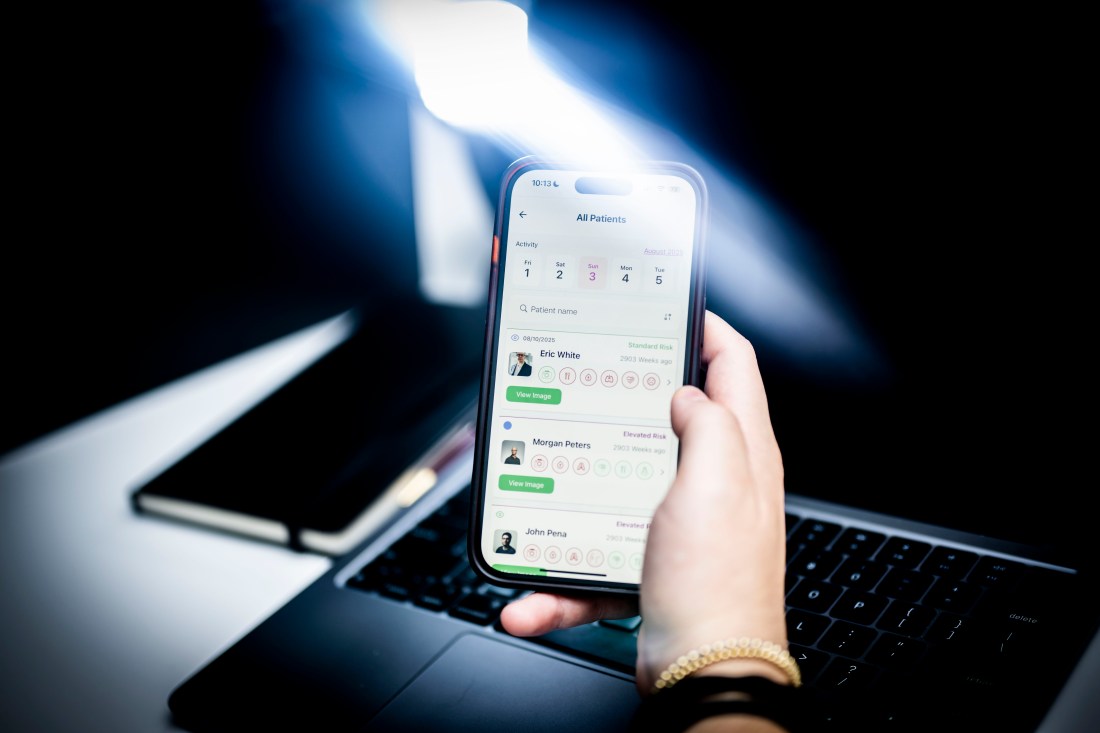Northeastern grads launch health care startup to reduce post-surgical infections and optimize clinical workflows

When Northeastern University graduate Talal Ali Ahmad launched an innovative predictive health care platform, he turned to fellow Huskies — including a new graduate — for backing, advice and help managing physician clients.
University networking events yielded a relationship with investor Jeff Berman, who is also a double Husky with an MBA from the D’Amore-McKim School of Business.
Berman now provides financial backing and strategic services for Predictive Healthcare, the startup founded by Ali Ahmad.
Another university event in March resulted in 2025 graduate Hailey Koppelman being hired as a client relationship associate.
She works directly with physicians at two major Boston hospitals on Predictive Healthcare pilot projects that use artificial intelligence to monitor post-surgical wounds for signs of infection.
Ali Ahmad says he met Berman through Northeastern’s Evolve Accelerator program, on which Berman served as a judge during a pitch competition a year and a half ago.
“Jeff reached out to me to see if I needed further help and I took his offer right away,” says Ali Ahmad, who was one of the winners in the competition.
“What he was presenting directly hit my sweet spot in terms of what I’ve been doing my whole career, which is digital transformation in health care and life sciences,” says Berman, co-founder of the Big Tree Innovation Fund.

In her turn, Koppelman, who majored in health science and minored in health care systems operations, says she met Berman at Northeastern’s Healthcare Industry Conversations & Connections event.
“Hailey stood out and offered the unique skills we needed,” Berman says.
Two pilot projects at major Boston hospitals
“Predictive Healthcare is focused on reducing surgical site infections by helping doctors detect them earlier through AI technology,” Koppelman says.
Specifically, a new product called MyHealthPal is being piloted at Massachusetts General Hospital-Brigham for patients who have had pacemaker implant surgery and at Tufts Medical Center for patients following breast reconstruction surgery, Ali Ahmad says.
The goal is to use AI algorithms to identify wounds that are becoming infected so they can be identified and treated early, he says.


“Patients go home and start taking a picture on our phone app of the wound based on a preset schedule by the clinician. Our patented technology analyzes the wounded vital signs for elevated risks so clinicians can take action,” Ali Ahmad says.
“If we don’t detect the infection early and treat it, it can become complicated, prolong recovery and could end up a chronic issue,” he says.
“Currently, the gold standard following surgery is getting a call the next day asking, ‘Talal, how are you doing? If you have any issues, give us a call,’” Ali Ahmad says.
Between that call and the patient’s next appointment, “There’s no connectivity or communication between the doctor and the patient unless something happens and the patient ends up at a clinic or in the emergency room,” he says.
“Our mission is to better connect patients with providers to streamline post-operative issues and help triage patient workflow for clinicians,” Ali Ahmad says.
Editor’s Picks
Helping post-surgical patients is personal
Helping post-surgical patients is especially important to Koppelman, who has had three surgeries, including one that left her with post-surgical complications.
When she was younger, she had two brain surgeries to eliminate seizures that she had suffered as an epilepsy patient.
It was an ankle injury she suffered at a gymnastics competition that resulted in concerns over the possibility of a post-surgical infection.
“I could barely walk,” Koppelman says. “I wasn’t readmitted to the hospital; however, it required multiple follow-up calls and visits.”
“An app like MyHealthPal would have been helpful in connecting me with my physician and sending photos to get a clearer answer as to why the wound looked the way it did throughout the healing process,” she says.
Koppelman, who did a project management co-op at Boston Children’s Hospital, considers working for Predictive Healthcare “a multidisciplinary job” for which Northeastern prepared her well.
The variety of classes she took at Northeastern — health care, pre-med, business and industrial engineering — have helped her figure out workflows, while Berman and Ali Ahmad have coached her on marketing strategies, Koppelman says.
“The great thing about working with MyHealthPal for Predictive Healthcare is I’ve been able to go and speak to doctors and research coordinators and come back to the team and say, ‘OK, here are the problems I’ve heard. Here’s how I think we can improve them,’” she says.
The co-op advantage
Berman says he’s participated in events at Northeastern over the years and is always impressed with the quality of students and their co-op experiences.
“I looked at all different types of schools for recruiting, but I went back to Talal and said, ‘We’re both alumni. We know what Northeastern produces. So let’s focus on Northeastern.’”










